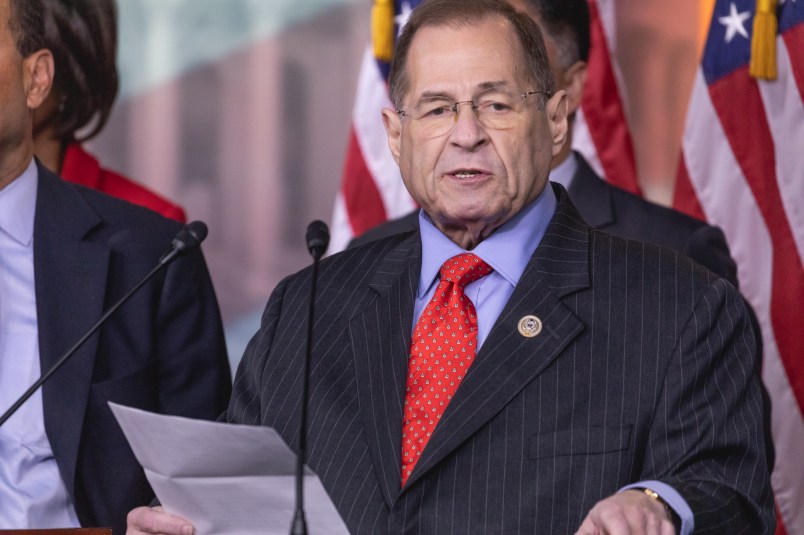House Judiciary Committee Chairman Jerry Nadler (D-NY) indicated he was preparing to subpoena acting Attorney General Matt Whitaker, if Whitaker resisted answering certain committee questions at hearing on Friday.
In a Tuesday announcement, Nadler said that he was scheduling a mark-up Thursday for his committee to vote to authorize him to subpoena Whitaker if need be.
“To be clear, I hope never to use this subpoena,” Nadler said, while referencing a letter he sent Whitaker last month informing him of topics of inquiry the committee had planned for the acting attorney general.
“If he appears on time and ready to answer those questions, the subpoena will be entirely unnecessary,” Nadler said in the statement Tuesday.
Last month’s letter to Whitaker signaled that the committee would ask him about his communications with the White House and about his handling of special counsel Robert Mueller’s investigation. It gave Whitaker until Wednesday morning to indicate whether the administration would seek to invoke executive privilege to shield such testimony.
The Justice Department did not to respond to TPM’s inquiry as to whether Whitaker will respond to the letter.
By putting Whitaker on notice that he will be asked about his White House dealings, and may be subpoenaed if he declines to answer the questions, House Democrats appear to be trying to avoid a situation that has become somewhat commonplace in the Trump administration, in which Trump administration officials have declined to answer committees’ questions without formally invoking privilege.
NSA Director Mike Rogers and Director of National Intelligence Dan Coats, for instance, refused to say in 2017 congressional testimony whether President Trump had sought to influence the federal Russia investigation. In their stonewalling, they also said that they had not received word one way or the other on whether the White House would invoke executive privilege on those matters.
GOP lawmakers, who until this year controlled both chambers of Congress, have for the most part not wished to compel administration officials’ testimony via subpoena. That is about to change now that Democrats have the gavel in the House.
If Whitaker does invoke executive privilege, it could set in motion a high-stakes legal battle between Congress and the White House.
House Democrats have also sought to return to a more bipartisan approach to subpoenas, after their Republican counterparts shut them out of the process when the GOP held the House majority.
Nadler said Tuesday that he had given the top Republican on the committee, Rep. Doug Collins (R-GA) a heads up last week about his desire to subpoena Whitaker, and Collins “expressed reservations.” They thus set up the Wednesday mark-up for a vote on the subpoena, in keeping with Nadler’s promise last week of a transparent subpoena process.
“There need not be surprises here,” Nadler said. “We have been quite public about our intention to obtain this information from Mr. Whitaker.”
Collins, nonetheless, issued a statement Tuesday expressing dismay over Nadler’s plans, given that Whitaker had already agreed to appear voluntarily in front of the committee. He said that the committee was “setting a dangerous precedent.”
“The message to witnesses here is, if you make the time and effort to appear of your own accord, Democrats are going to subpoena you anyway,” Collins said.
Read Nadler’s full Tuesday statement below:
“For the first two years of the Trump Administration, Congress allowed government witnesses to dodge uncomfortable questions. That era is over. In an abundance of caution-to ensure that Mr. Whitaker both appears in the hearing room on Friday morning and answers our questions cleanly-I have asked the Committee to authorize me to issue a subpoena to compel his testimony.
“To be clear, I hope never to use this subpoena. Weeks ago, we gave Mr. Whitaker a list of questions we hope to ask him about his communications with the White House and his refusal to recuse himself from oversight of the Special Counsel’s investigation. If he appears on time and ready to answer those questions, the subpoena will be entirely unnecessary.
“I intend to be fully transparent about this process. I shared my plans with Ranking Member Collins last week and, when he expressed reservations, we scheduled this authorizing resolution for a markup. There need not be surprises here. We have been quite public about our intention to obtain this information from Mr. Whitaker.”
Corrected: This post initially stated incorrectly that the mark-up is on Wednesday. It is actually on Thursday. This story has also been updated to include a statement from Collins.










